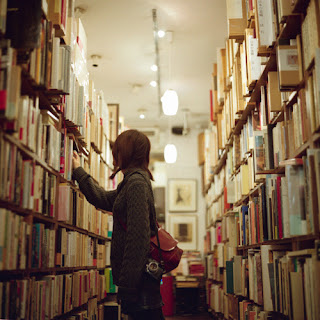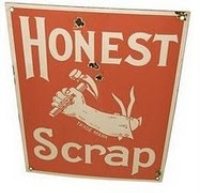It's only natural that writers love to read. After all, if you don't enjoy reading books, then why bother writing them in the first place? I have to admit, though, that I don't love reading some of the scholarly books I have to read for my dissertation research; there are several dents in my walls from where I threw the books at them. I think there should be some kind of Grad Student Dictionary, so that it would be easier to figure out exactly what academic writers are saying. A lot of them make up their own words, as if they're using some kind of language that only know-it-alls can understand.
When I'm not studying, I like reading chick lit. I only watch crime dramas on TV, so it's kind of nice to read stories that aren't about soccer moms who are actually serial killers or lawyers arguing about whether a defendant can be found not guilty by reason of watching too many reality shows.
On the other hand, there are a lot of things that I would like to read about that I don't often find in chick lit. I like reading stories that I can relate to. Maybe I'm being self-centered, but I like reading about main characters who are like me (but who are possibly less neurotic and obsessive, because then there'd just be several pages of description of them drinking coffee, ranting about their neighbors, and yelling at inconsiderate drivers).
For example, I wish there were more books about the grad school experience. One of my favorite authors does write about academia; Jhumpa Lahiri's stories often include charactes who are professors or grad students. Lahiri isn't a chick lit author, but the world she describes is familiar to me.
But there aren't a lot of chick lit books about grad students. Many of the female protagonists work in publishing or journalism, though they often have secret aspirations of writing fiction. I did find one book where the main character went to grad school, but she and her friends spent more time going to bars every night than they did in the library.
I will admit that there is a lot of drinking in graduate school, but I don't usually participate in any of it because it never ends well for me. Once I came out of a bar and tripped and fell into a crowd of people. Another time my face turned red and I started talking really excitedly about everything, because at that moment, EVERYTHING was exciting.
Besides, alcohol costs money that I don't have. As I've mentioned before, university departments apparently believe that grad students don't need enough money to live on, which is why they give them tiny stipends if the students are lucky. They apparently think that we can just live on our love for learning, when really we're tearing our hair out every thirty seconds and shrieking, "Not ANOTHER footnote!"
I wish I could read books about grad students who are as burned out as I am, and who spend years struggling just to keep up while their classmates go on to excel in their classes, publish articles in academic journals, and win fellowships. (And of course, we less successful classmates get to hear all about it.)
Another thing I like about Jhumpa Lahiri is that she writes a lot about loneliness. In her book of short stories, Interpreter of Maladies, I think she only used the word "lonely" once or twice. But she was still able to clearly illustrate how lonely her characters were, just by giving small clues about their lifestyles.
In most of the chick lit books I've read, the main characters always seem to have a lot of friends who are always there to provide advice and a sympathetic ear; they often seem to be a lot more well-adjusted than the main characters. I do have friends, but we don't get to see each other as often as we'd like because of our work schedules and personal responsibilities.
I watched the first two or three seasons of Gilmore Girls , which I think were the best ones; the plots didn't always center on who was in a love triangle each week like they did in the later seasons. I liked the fact that the main character, Rory Gilmore, was a loner. She had a boyfriend and a best friend, and she was close to her mother. But she spent a lot of her time alone, reading, and it wasn't portrayed as being the worst thing in the world. She was independent, and I liked that. I wish there were more characters like her in fiction, because I think there are a lot of people like her in real life.
I'd also like to read a chick lit book where for once the female protagonist ends up with the Unsuitable Suitor rather than the Cute Guy Friend who was there all along, or the Competitive Coworker who the protagonist hated at first until they made out in the supply closet, or the Bossy Know-It-All who constantly criticizes the protagonist because apparently she always does the wrong thing (the only Bossy Know-it-All that I actually liked was Mr. Knightley from Jane Austen's Emma, though I'm not sure what the brilliant Ms. Austen would think of having her work classified as chick lit).
More often than not, the Unsuitable Suitor is more fun and interesting just because he provokes the protagonist and makes her step outside of her comfort zone. Usually he isn't given any redeeming qualities, which is why he's Unsuitable, but there has to be some reason the narrator falls for him, right?
There should also be more books about teaching. Most of the books that I've found about teaching were memoirs, where the teacher writes about how the students were difficult at first but then they grew to really care about each other. Then they never gave her any problems ever again because the teacher came up with original ways to educate them. They all lived happily ever after and formed glee clubs where they broke out into song just at the sight of each other. (Oh wait. That's actually a TV show. But nobody's a sociopath on that show - I don't think - so I never watch it. I did try once or twice, but it didn't really hold my interest.)
I'd like to read about people who like teaching but get frustrated with it on a regular basis, to the point where they're tearing out their hair and shrieking, "Not ANOTHER lame excuse!" I'd like to read stories about college instructors who don't love reading fifty papers about the same topic every week or teaching the same class every year. I'd like to know what keeps them going and how they keep from losing control when things don't get any easier.
Thinking about what I want to read inspires me to include those types of things in my own stories. I usually follow the old rule that says you should "write what you know", and this is what I know.
What do you look for when you're deciding which books to read?
Erica and Christy were nice enough to give me the Versatile Blogger Award; thanks ladies! I love awards.
Check out their awesome blog here.
According to the rules for this award, you're supposed to list seven things about yourself, but I actually already did something similar to that when I received the Honest Scrap award from Lilly; you can check out that post here. And I stand by what I wrote in that post, including the part about how Britney Spears deserves more recognition and awards just because she's so awesome.
Wee Con and Edinburgh Part 3 of 5 Edinburgh Part 2 and Blog Thoughts
-
[image: D]ecember, into January!
Yes, these photos are from the end of October but I wanted to keep sharing!
Wishing everyone happy holidays and a Happy Ne...
1 week ago










I DO think of Jane Austen as chick lit!! And I love the genre too. As for what you want in it, you should just write it yourself!
ReplyDeleteHi Karen,
ReplyDeleteI think I will! Maybe not all in the same book, though. I tend to write stories that are too long. :)
Thanks for the inspiration. Now I will have to check out Lahiri :) I agree that there aren't enough books about chick grad students. I did find Groff's Monsters of Templeton and Katherine Howe's Physick Book of Deliverance Dane (though admittedly, the last is more along the lines of a Possession-type romance about research). Good luck!
ReplyDeleteAll I read are PF books.
ReplyDeleteAnd chick-lit like Sophie Kinsella's works, although I find some OTHER chicklit writers to be awful. There's an art to writing a good fluffy story.
Hi Anna,
ReplyDeleteThose titles sound interesting; thanks for the recommendations!
Hi FB,
The only PF book I read was Suze Orman's book for the Young, Broke and Fabulous; it was pretty good. I like Sophie Kinsella's books too. I went to one of her booksignings in Chicago and she was so nice to everyone. You're right, though, about how some chick lit authors are bad. I've bought a couple books lately that I regretted buying.
Why not write a chick lit book set in a university? I'm sure you could write an entertaining book about it.
ReplyDeleteI guess Jane Austen could be seen as classical chick lit--just never thought of it that way!
Hi notesfromnadir,
ReplyDeleteThat's a good idea. I think it'd be interesting to write about it from the college teacher's perspective, because I got this whole other view of college once I started teaching.
Graduate reading? The worst. In my History courses, I had to read a book a week. When it was four or five books a week, it was not easy to keep up. I think I took a fiction break for several years after that.
ReplyDeleteI can't think of any good graduate student protagonists either. The Wonder Boys was my favorite that had graduate students in it. I think they were graduate students. It was a long time ago.
If I come across any good fiction like what you're looking for, I'll let you know.
Hi Theresa,
ReplyDeleteFour or five books a week is definitely a lot. I know of several graduate students who don't read outside of school just because they have to do so much of it for school. It is interesting that there aren't a lot of graduate student protagonists, especially since so many people pursue advanced degrees these days.